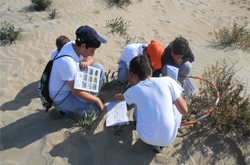This daylong program includes the students’ participation in a sequence of activities, which give emphasis both on theoretical and practical aspects and it is based on the methodology of problem solving. It is organized in a way that supports the understanding of environmental concepts and issues and enforces students into an exciting learning adventure.
1. Mission.
Students receive a letter from Captain Mike at school. The concept refers to two mysterious trunks have been found at a secret seashore. Thus, students are invited to CYCERE to open these treasure chests and discover the hidden secrets. Upon their arrival to the Environmental Center, students find out that one of the treasure chests is unlocked and the other is locked. In the unlocked treasure chest students find their mission and a map, which guides them through a sequence of activities into the secret combination needed to unlock the second treasure chest.
2. Introduction: senses and experience.
Students use their senses to explore coast and the coastal landscape. They also share the experiences they had with the sea.
3. Study and discover.
Students study and discover the organisms observed at the coast, as well as the food relationships between them. Students are also asked to make measurements of the abiotic factors and gather information and materials from the coast, in order to be able to represent this natural ecosystem.
4. The coast and the man.
Students trace and study the presence and the impacts of the man in this area area. Afterwards, they investigate the relationship between man and coast and they try to portrait this relationship.
5. Problem solving.
Students are gathered in the ecology laboratory, where they analyze their data and they create a model of the ecosystem they studied. At this point, students find out the secret combination and they unlock the second treasure chest. Following, they study some further data contained in the second treasure chest, they discuss their concerns and draw conclusions. Finally, they identify the need for sustainable management of ecosystems, developing positive attitudes and values towards the environment.
6. Action.
Students returning back at school are asked to extend their action both in an individual and collective level (classroom, school, community) for the protection of the coasts. Students can also participate at the competition “Save the Coasts” announced by CYCERE at the beginning of the school year.

 Κυπριακό Κέντρο Περιβαλλοντικής Έρευνας & Εκπαίδευσης – Κυκπεε
Κυπριακό Κέντρο Περιβαλλοντικής Έρευνας & Εκπαίδευσης – Κυκπεε




